LANDSCAPE PROS - Jimmy The Mower: It started with a tweet...
14 Dec 2021 Kawasaki Community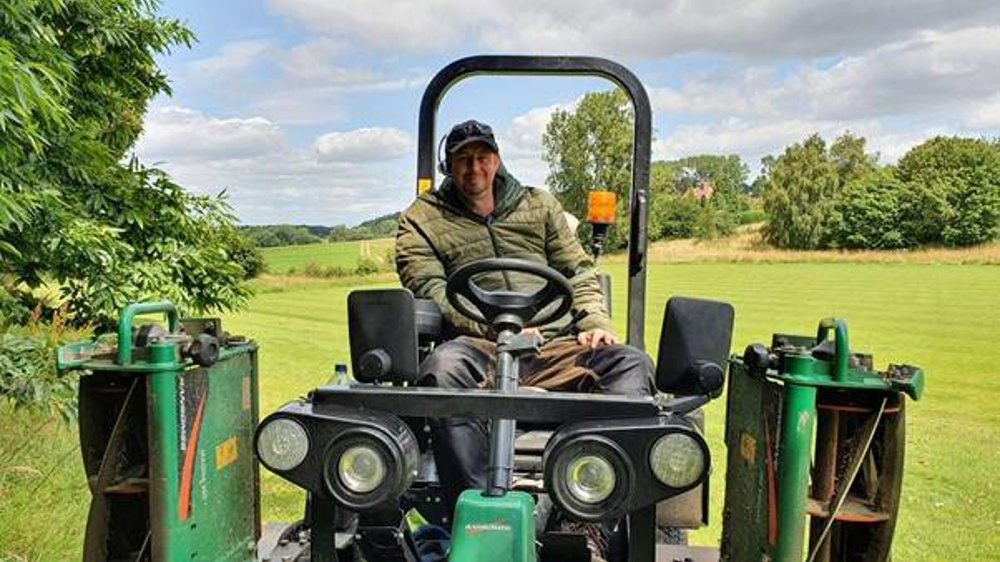
James Broadhouse, aka Jimmy The Mower who runs Dittons Services, came sixth in this year's Turf Business Turf’s Top Influencer Award.
The award, which recognises the industry's most influential people, is voted for by fellow professionals across the field. It placed Jimmy in the company of some of the finest groundsmen in the business from the likes of MCC Lord's, Real Madrid, Arsenal Football Club and Royal St George's Golf Club.
And it all started with a tweet...
Can you talk us through your early days in the business?
I guess you could say I kind of fell into the industry. I worked as a retail manager before having to leave for family reasons. In my home village, I looked about for some gardening work and I enjoyed it. Then, when the person doing the local pitches got sick, I offered to cut and line them.
So, tell us about the tweet...
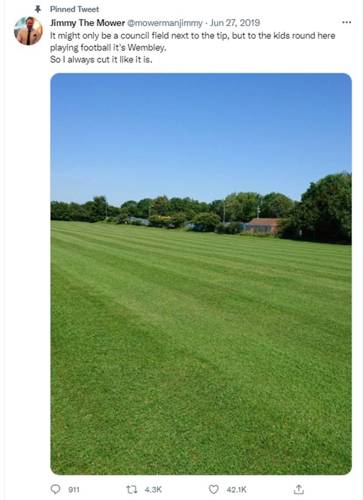
It was the summer of 2019 and I’d been mowing a council pitch in Bilbrook in Staffordshire. The field is next to a tip and the kids used to have a kick about, but I cut it like I would any pitch – with pride. I put some good stripes in and fired out a picture of it with a tweet that said: 'It might only be a council field next to the tip, but to the kids around here playing football, it's Wembley. So I always cut it like it is.'
And that tweet has been seen by over three million people, become the most watched video on the BBC website, led to countless TV and radio appearances and saw you being invited to Wembley Stadium by the head groundsman to help cut the pitch; how did that feel?
I honestly couldn’t believe it. But it really reflects the ethos you should have towards any job – do it to the best of your ability using the right machinery for the job. One of my top tips for success is to enjoy what you do. It doesn’t matter if you’re cutting a council pitch next to a tip or filming with experts, do everything with pride and you’ll get results.
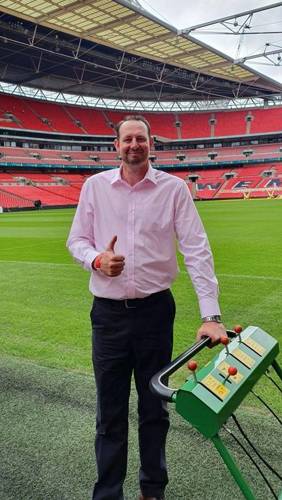
It must have changed the trajectory of your career?
Yes, it undoubtedly has. An unexpected community grew on Twitter as people started sending me photos of their finely-manicured turf and it really highlighted how much these parks and open spaces mean to people.
That’s why I started up the #patchoftheday with a weekly winner, and that grew to a YouTube channel which just took off. I use it to provide information on the basics of grass cutting, machinery maintenance and help and advice. I still go out mowing, but I do a lot of media appearances and business collaborations now as well!
Tell us a bit more about your YouTube channel
It’s a way to pass on my knowledge, what I’ve learned from being in the business. Hopefully it means that others can avoid some of the common mistakes that are easy to make. I review equipment in real-life situations, for example, providing honest accounts of how they work, which helps influence purchasing decisions. We take machines apart and build them again to show the intricacies of the engine and the machine. Hopefully it teaches people how their equipment works and gives them the confidence to fix issues themselves.
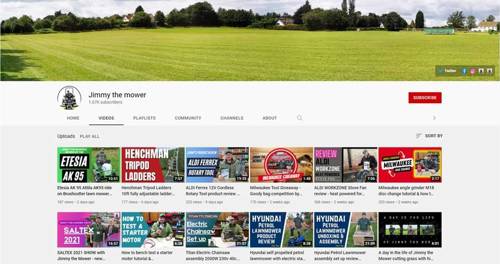
A good example of this is how a simple job like changing an air filter can end up causing more damage than you started with, and it’s all based on which jubilee clip/sliding ring you remove from the attaching pipe. Go for the one at the top – which is the most obvious – and the angle and movement of removing the pipe from the filter can cause it to crack. That pipe is expensive so that’s the last thing you want. If you remove the clip from the bottom though, it’s a much smoother process and comes off completely and very easily.
What are the most common questions you’re asked?
That’s easy, it’s hands down ‘what machines should I buy?’ The basics for a business in lawncare are a mower, a strimmer and a blower. With these three items you can do a decent job grass cutting - which is the bread and butter of any lawncare business. Trim the edges first, put the clippings back onto the grass, then mow and blow. This will give the healthiest grass and the cleanest finish.
In terms of what machinery to buy, I always say buy the best you can afford. Anything else is a false economy and, believe me, I’ve been there and done that! Cheaper engines lead to so many issues and then finding replacement parts can be hard. It really isn’t worth it.
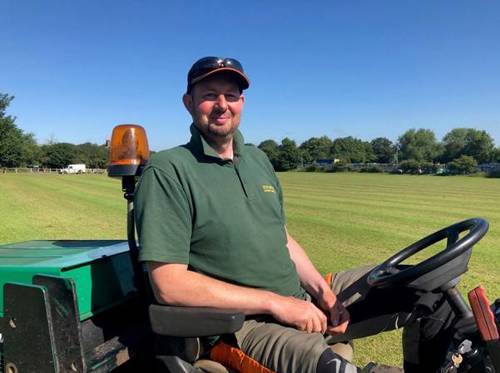
How important are machinery choices in your business’ success?
Absolutely vital. The first equipment purchase I made was a line-marker for the village pitches and it was such a big investment. I had sleepless nights over it. You don’t know if it will bring value back in: will it pay for itself and how long before it brings in a profit? Deciding what to invest in is such an important and strategic decision and never one to undertake lightly, even now it can still make me nervous!
What do you base your machinery purchases on?
- Reliability
- Engine quality
- Durability/robustness
- Availability of parts
Do you own any equipment with a Kawasaki engine?
Yes, in a fleet of six mowers, half are powered by Kawasaki Engines. We have a Ferris Hydro walk, Ariens Ikon zero-turn 42 and Etesia Attila AK95 ride-on brushcutter.
The engine is one of the main factors in the machinery choices I make and when it comes to Kawasaki Engines, it’s a trusted brand and a safe choice. The quality speaks for itself with its trouble-free operation.
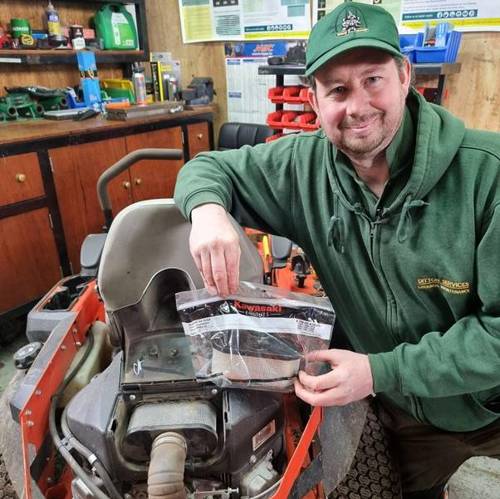
How do you make sure you get the best from your machines?
I highly recommend using Engine Service Records. I have them for both the two-stroke and four-stroke engine machines. They’re brilliant for keeping a lot of useful information relating to your machinery and servicing in one place.
Another way to ensure you don’t get the most from your two-stroke machine is to get the ratio of oil to petrol wrong. It’s so easy to get wrong, but it’s also easy to get right! A small two-stroke engine like a blower - which is an essential bit of kit - doesn’t have a separate oil reservoir and petrol container like a four-stroke does. In the larger engines you’ve got a petrol container and an oil container and they don’t mix, but in the smaller engines it all goes into one tank: the oil to lubricate the engine and the petrol to fuel it, so you’ve got to mix it first and the ratio varies from 25:1, 32:1, 40:1 and 50:1.
It was such a common question from followers that I designed a series of handy tables on various ratios for small two-stroke engines on the subject. You can find those, and some printable Engine Service Records, on my website.
What’s the biggest misconception you come across?
Other people’s misunderstanding about the job – that it’s ‘just a bit of grass’. That ‘bit of grass’ also needs aerating to increase the air circulation in the root zone, reduce the incidence of disease, improve the uptake of water and nutrients and reduce soil compaction. You need to scarify it to remove the surface thatch without damaging the healthy grass, then there’s the balance of fertilisers and weed and disease control, among many other things!
Another misconception is that one machine fits all... it definitely doesn’t! You won’t get the finish you want by using a three-blade machine to mow out the brambles and cut down two-foot-long roughs, for example. It’s not what it was designed for and you’ll just damage the machine. You need the right tools for the job. Our YouTube channel spends time educating people on how to use the machines to the best of their advantage as this can oftentimes be overlooked, and this safeguards the investment too.
What piece of advice would you give those starting out with their own business in the industry?
Knock-backs happen but it’s not personal. At some point, you will probably lose a contract. It will be hard, but you have to realise that, more often than not, it will be because there’s a committee of people voting and someone else has come in cheaper than you. Build from the ground up with a sense of worth and value and believe in yourself, it will all come good.
What are your top tips for business success?
- Be prepared to work hard
- Put the customer first and focus on service
- Make good machinery choices
- Enjoy it
So, what’s next for you?
In October 2019, I was invited to SALTEX to be a speaker at Learning Live. They wanted me to speak about Groundsmanship in the media and since then the direction of my career has put me in front of people who know an awful lot about specific subjects. For example, I’m filming with Sally Jarrett and Collier Turfcare soon, about using chemical compounds in turf renovation. With opportunities like that, it felt right to up my understanding in certain subjects too so I’m doing a foundation course at Myerscough College.

Find Jimmy online at jimmythemower.com, on Twitter @mowermanjimmy and YouTube.
You may be interested in
-
How will environmental legislation like ULEZ affect landscapers?

-
Help us shape our support for professional landscapers – take our survey today!

-
Kawasaki Engines parts and technical manager Jon Couling discusses the support network that keeps landscapers working year-round

-
Powered by Kawasaki: Introduction to Husqvarna

-
Kawasaki Engines Christmas Quiz

-
Iwan Jones joins the ranks of Kawasaki prizewinners winning a brand new multi-tool







